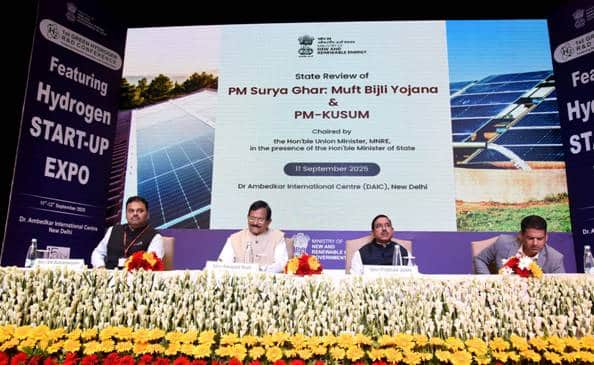India Aims for Indigenous Solar Cells by 2028, Focus on Domestic Wafers and Ingots

Union Minister for New and Renewable Energy, Shri Pralhad Joshi, has unveiled India’s ambitious plan to establish a fully indigenous solar value chain by 2028. During a recent State Review Meeting on Renewable Energy, he emphasized the country’s shift from merely assembling solar modules to developing domestic capabilities for manufacturing wafers and ingots. This initiative aims to reduce reliance on imports, create jobs, attract investments, and position India as a leader in clean energy manufacturing.
Progress Towards Renewable Energy Goals
In his address, Minister Joshi commended the significant contributions of various states in advancing renewable energy initiatives. He noted that India is on track to achieve its 2030 goal of 500 GW of non-fossil fuel capacity, having already surpassed 251.5 GW. This progress, he stated, reflects the visionary leadership of Prime Minister Narendra Modi, which has transformed India’s clean energy landscape and bolstered domestic manufacturing in the renewable energy sector. The Minister’s remarks highlighted the importance of these developments in propelling India towards its vision of a developed nation, or “Viksit Bharat.”
Joshi also pointed out that the country has achieved a remarkable milestone, with 50% of its installed electricity capacity now sourced from non-fossil fuels, five years ahead of schedule. However, he cautioned that this capacity addition must be matched by effective utilization. He urged states to expedite Renewable Purchase Obligations (RPOs), power purchase agreements (PPAs), and land allotments transparently to ensure timely progress in the renewable energy sector.
Key Initiatives and Their Impact
The Minister highlighted the success of key government schemes, such as the PM Surya Ghar Muft Bijli Yojana, which has already benefited nearly 20 lakh households. He called on states and distribution companies (DISCOMs) to ensure strict adherence to quality standards, finalize agreements promptly, and provide optimal tariff credits to consumers. Regarding the PM-KUSUM scheme, Joshi noted its growing momentum across states, with Chief Ministers requesting additional allocations. He announced that the second phase of PM-KUSUM would be launched after the current phase concludes in March 2026.
On the topic of free electricity, Joshi emphasized the need for sustainable delivery of benefits. He revealed that almost half of the beneficiaries under the PM Surya Ghar Yojana are receiving zero electricity bills, showcasing a model that balances citizen relief with long-term sustainability.
Enhancing the Renewable Energy Ecosystem
Minister Joshi stressed the importance of improving the ease of doing business in the renewable energy sector. He urged states to implement single-window clearance systems, reduce compliance burdens, and address issues related to land acquisition and law enforcement that developers face. He pointed out that investor confidence is crucial and depends on proactive support from state governments.
Additionally, he called on states rich in wind resources to develop time-bound roadmaps for new site allocations and transmission readiness. The recent reduction of the Goods and Services Tax (GST) on renewable energy devices and services from 12% to 5% was welcomed, as it is expected to make solar, wind, biogas, and waste-to-energy systems more affordable. Joshi also highlighted the success of the Production-Linked Incentive (PLI) Scheme for High Efficiency Solar PV Modules, which has led to significant investments and job creation in the sector.
Collaborative Efforts for a Sustainable Future
Shri Joshi concluded by emphasizing that India’s energy transition will require collective action from the central government, state authorities, industry stakeholders, and citizens. He assured that the Ministry of New and Renewable Energy (MNRE) would provide full support and encouraged all parties to share ideas to accelerate the growth of renewable energy in the country.
Union Minister of State for New and Renewable Energy, Shri Shripad Naik, also spoke at the meeting, highlighting the significance of the PM-KUSUM and PM Surya Ghar schemes in ensuring energy security and sustainability. He noted that the PM-KUSUM scheme has been transformative for farmers, with over 16 lakh solar pumps installed, leading to substantial reductions in diesel consumption and carbon emissions.
The review meeting organized by the MNRE included a state-wise assessment of the PM Surya Ghar and PM-KUSUM schemes, allowing states to present their progress and challenges. Industry associations participated in discussions on current issues in the renewable energy sector, aiming to align state actions, industry inputs, and policy reforms to enhance renewable energy deployment across India.
Observer Voice is the one stop site for National, International news, Sports, Editor’s Choice, Art/culture contents, Quotes and much more. We also cover historical contents. Historical contents includes World History, Indian History, and what happened today. The website also covers Entertainment across the India and World.

